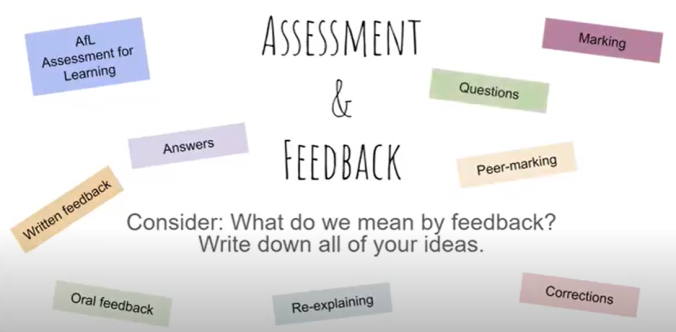This week, one of our programme managers, Ailish Coghlan, held an online Tutor Clinic about Assessment & Feedback....
‘Tutor Clinics’ are an opportunity for our tutors to learn more about various pedagogy practices and teaching skills to enhance their tutoring abilities. Tutor Clinics are run by our programme managers who are qualified teachers so each of them bring unique perspectives and insights to these events.
Defining ‘assessment & feedback’
Ailish began by defining assessment for learning (AFL) as ‘methods to measure the effectiveness of teaching practices and the extent to which pupils are learning from these practices’. The key with AFL, she explains, is that the focus is on the students’ learning.
She breaks down AFL into two categories:
-
Formative AFL - tutors do this throughout the tuition session by assessing students’ understanding of a subject and seeing if adaptations are needed to assist their learning. This might come in the form of asking a student questions, re-explaining a concept or asking students’ to continue practising with additional exercises.
-
Summative AFL - this would usually happen at the end of a tuition session (or programme) to assess how much students’ have learned. This type of assessment also often gives students’ a grade.
The focus of this tutor clinic was on Summative AFL & Effective Feedback. Ailish highlights the summative assessment that Team Up offers to pupils at the end of sessions to assess their knowledge of the topic for that day: Topic Tests (see image below).
The value of effective feedback
Ailish shares research from the Education Endowment Foundation, which is a charity that seeks to improve the education attainment of disadvantaged students in England by providing evidence-based resources designed to improve teaching practices and boost learning (EEF, 2022). Key insights she shares include:
-
Effective feedback can help students progress by up to 6+ months faster than the expected rate of progress for their age group.
-
Positive impacts of effective feedback is high across all curriculum subjects, but slightly higher in maths and science.
-
Low attaining pupils tend to benefit more from the explicit feedback than high attainers.
So…what is ‘effective feedback?’
1) Give students time to work independently and give them room to make mistakes. Be selective when to give that immediate feedback in your tuition sessions!
2) When giving feedback... Ask, don't tell!
-
In maths, ask them detective questions that help them identify where they went wrong and put them on the right path, without giving them the answer.
-
In English, ask them to identify where they didn't reach their target or the Tutor can highlight the sentence for improvement and ask them what could be improved.
-
For both, ask them to recall what knowledge or steps they need to improve. Get them to do the work!
3) In maths...
-
There are ‘careless mistakes’ and ‘errors resulting from misunderstandings’: careless mistakes could be a simple times table mistake vs misunderstandings might be a more fundamental problem like an incorrect formula.
-
When a careless mistake has taken place, ask them to look at their work again and identify the problem. With more fundamental mistakes, provide them with hints and ask questions that lead them to underlying principles.
4) In English...
-
Give students success criteria to include in their writing. E.g. one example of exciting vocab, one example of adventurous punctuation and one complex sentence.
-
Ask them to identify it in their work when marking so they can pick out where they've used it and check their own work.
-
Ask them how to recall examples of ingredients they are missing, e.g. "colossal" for vocab, or the components of complex sentences.
Next steps...
-
Ask them to upgrade or rewrite their work to include these.
-
Ask them to add to their work with a higher target if they've met the criteria you've already given them. Push them to the next level!
5) Create target sheets and/or misconception sheets
-
Create a sheet with their targets that they build on each lesson and can refer to before and during each task (e.g., using punctuation throughout their writing).
-
Misconception sheets in maths help to remind them of their common misconceptions. Research shows that this helps learners avoid making the same mistakes!

